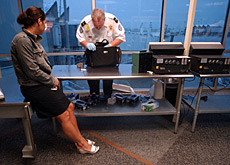Blocher has misgivings about new US entry rule

Swiss Justice Minister Christoph Blocher says he has doubts about planned new entry restrictions to the United States from European countries, including Switzerland.
Blocher expressed his misgivings about having to register online to US authorities 48 hours before departure to the US Secretary of Homeland Security, Michael Chertoff, in Washington.
He said having to register and fill out a questionnaire before a journey was an added administrative burden.
Chertoff had “calmed him a little” by saying that registration would not be needed for every visit but would be valid for one or two years, describing it as a “purely formal procedure”, he added.
The new legislation was approved by the US Congress on Friday.
Blocher, who has ended a two-day visit to the US, said it was clear that the US could refuse entry to its territory if the answers were not satisfactory.
He added that Switzerland could do little against the new measure. A spokesman of the European Commission has said that the European Union would also not oppose the new regulation.
During his stay, Blocher also met his US counterpart, Alberto Gonzales, the head of the Federal Bureau of Investigation, Robert Mueller and the director of the Office of National Intelligence, Michael Mcconnell.
Fight against terrorism
Their talks focused on bilateral cooperation in security matters, in particular the fight against terrorism.
“Terrorism is a major international problem and it’s very important that our cooperation is stepped up, even though there is no specific issue at present,” Blocher told swissinfo at the end of his visit.
The reinforcement of bilateral cooperation concerning terrorism is included in the new agreement signed by Blocher and Gonzales in July last year and approved by both houses of the Swiss parliament.
“This accord will probably come into force at the end of next year,” Blocher said.
During his visit to Washington, Blocher presented the new biometric Swiss passport, which contains information stored electronically, and informed his US colleagues about the Interpol databank on lost or stolen travel documents.
He called on the US to take a greater part in Interpol, for example by giving information more quickly.
Data bank
“Switzerland has been very active in this databank since 2005 and more than 22,000 police officers in Switzerland have access. We make between 100 and 120 entries into it every month,” Blocher said.
“The Americans aren’t completely integrated into the Interpol databank,” he added.
Earlier this month Chertoff said he had a “gut feeling” that the al-Qaeda terrorist group was plotting new attacks against the US, and President George W. Bush presented a report to Congress which said that al-Qaeda was more powerful today than a year ago.
“Chertoff is very preoccupied with the fact that al-Qaeda used people with passports or identity papers that allowed them to travel around Europe and then to the US,” Blocher told swissinfo.
“We also have information that shows an increase in the use of false documents,” but he added that for the time being there were no indications of a forthcoming act of terrorism, neither in Switzerland nor in the US.
swissinfo with agencies
The Operative Working Arrangement (OWA), which has been approved by both chambers of the Swiss parliament, is set to replace an existing treaty in force since 2002.
The new treaty extends the scope of the original OWA, which was set up to regulate judicial cooperation in the wake of the 2001 terrorist attacks in the US.
It provides the legal basis for joint investigations on terrorism and its financing. These would only be set up once criminal proceedings had been launched in both countries and handed to a prosecutor.
Unlike the first OWA, cooperation is no longer limited to investigations related to al-Qaeda and the September 11 attacks, but extends to all radical Islamist groups linked to al-Qaeda.
The new treaty ran into trouble in parliament when centre-left parties in Switzerland expressed serious reservations about the deal, but they failed to stop it being approved.
The US Congress gave final approval on Friday to legislation that requires tighter screening of air and sea cargo, and shifts more federal anti-terrorism grants to high-risk areas such as New York and Washington.
Voting 371 to 40, the House followed the Senate, which voted 85 to 8 Thursday night, to send the measure to the White House for signing by President Bush.
The bill also sets up a program requiring air travellers from 27 friendly countries to register online with the US government as much as 48 hours before departure.
Passenger lists are now sent 15 minutes after takeoff. The change will give US authorities more time to vet passport data for high-risk travellers. Most of the nations are in Europe.

In compliance with the JTI standards
More: SWI swissinfo.ch certified by the Journalism Trust Initiative











You can find an overview of ongoing debates with our journalists here . Please join us!
If you want to start a conversation about a topic raised in this article or want to report factual errors, email us at english@swissinfo.ch.